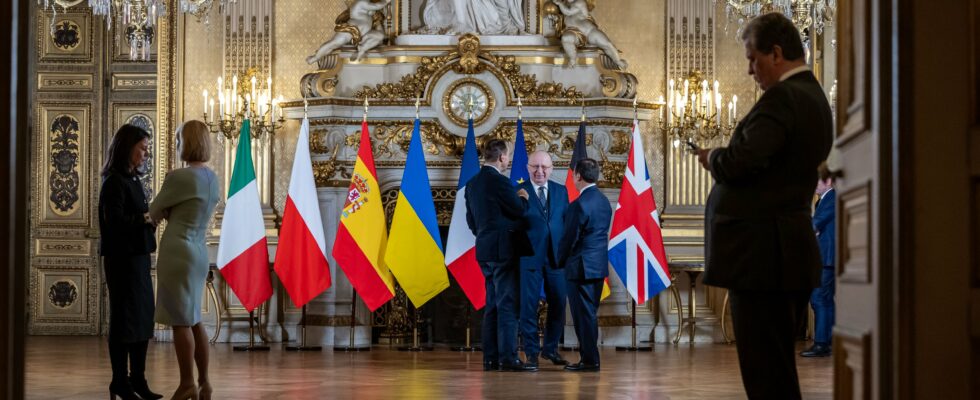Moscow and Washington are getting closer. Ukraine and the European Union observe them. Time is counted: European leaders have understood this since the Munich conference, organized from February 14 to 16. A summit that has only increased “the extent of anxiety in Europe in the face of the efforts of the United States to control the process and exclude Europeans from any negotiation”, according to The Guardian.
These concerns were intended in particular on Saturday, when Donald Trump’s special envoy for Ukraine, Keith Kellogg, said that it was not realistic that European leaders get involved. “It’s like chalk on a blackboard. It can be a little unpleasant,” he said before adding: “Participate in the debate, not by complain of being, yes or no, at the table [des négociations, NDLR]but by presenting concrete proposals, ideas, increasing the expenses [de défense, NDLR]”. The fears are double for Europe: no longer being able to count on the military protection of the United States and see Donald Trump has hastily sign a peace agreement with his Russian counterpart, which would compromise the security of kyiv and the whole continent.
Since these announcements, “European leaders have agitated”, underlines the BBC. Who notes that “the summit on security organized in a hurry Monday in Paris is proof”. Emmanuel Macron convened an emergency meeting of European State Heads on Sunday. In their sights, two dates: that of April 20 and May 9. “High Ukrainian and Western officials have said that Trump and Putin would likely try to get a cease-fire in one of the two important dates to come: Easter, that the Orthodox and Catholic churches will both celebrate on April 20, Or on May 9, when Russia celebrates the Soviet victory over Nazi Germany, “revealed the Financial Times.
The “shock” of the Munich conference
“The Trump team leaves behind an alliance in crisis”, title for its part the American daily The New York Timesadding that “a historical breach seems to open up in the Western alliance”. In the aftermath of the Munich conference, European leaders were “in shock”. After three years of war on Ukrainian territory, the administration of the American president clearly indicated that she planned to concentrate his efforts in other regions: in Asia, in Latin America, in the Arctic. Wherever Donald Trump thinks he can get mining agreements. For the Spanish newspaper El Mundo Who title “Ukraine, mission impossible”, there is no doubt: “the gap between the two banks of the Atlantic has widened in a weekend.”
In response to the situation, British Prime Minister Keir Starmer announced Monday morning in the columns of Telegraphthat the United Kingdom was “ready to send troops on the ground”. Same speech in Sweden, where the Minister of Foreign Affairs Maria Malmer said that the sending of peacekeeping soldiers to Ukraine was not “excluded”.
France, it has decided to put double bites by inviting European leaders on Monday afternoon for a crisis meeting in order to agree, among other things, the position that Europe should adopt as to the future membership of Ukraine at NATO. Only countries with a military weight will be present, namely, the United Kingdom, France, Germany, Italy, Poland, Spain and Denmark, which should represent the Baltic and Nordic countries. To this list of guests are added the president of the Council of the European Union as well as the NATO Secretary General.
Europe “plays with fire”
For the BBC, leaders must seize their luck. “Europe has a tiny opportunity window to try to persuade the American president that she is an invaluable partner. She hopes to achieve this through this meeting in Paris. […] The meeting will not lead to an official agreement, but rather to a stirring session “, can be read on the site.
The challenges will be numerous. During this Paris meeting, agree on a concrete amount of defense expenses promises to be perilous. Poland, for example, plans to devote 4.47 % of its GDP on this subject in 2025, while the United Kingdom, tries, in vain, to reach 2.5 %. Peacekeeping in Ukraine, without American presence or NATO military umbrella, could therefore be a more than delicate mission for European countries. Europe “plays with fire”, writes the German daily Last Tagesspiegel, Who accuses him of being “myopic” since “without the United States, the European armies have nothing to counter Russia”.
The Times shows himself confident for the rest of the negotiations. “America can retropedalize in relation to the brutal declarations of JD Vance. Donald Trump could meet Putin, but not necessarily soon since the preliminary meetings between the American and Russian teams will probably destroy the hopes of a quick resolution,” read. “There is time. Russia is unable to invade a western European or NATO country,” reassures the British daily.
It will be necessary to answer many questions raised by Donald Trump: how many soldiers each European country should send, for what time and under what command? What would be their mission if Russia did not meet the conditions for a ceasefire agreement? A list of questions that European leaders will look on on Monday.
